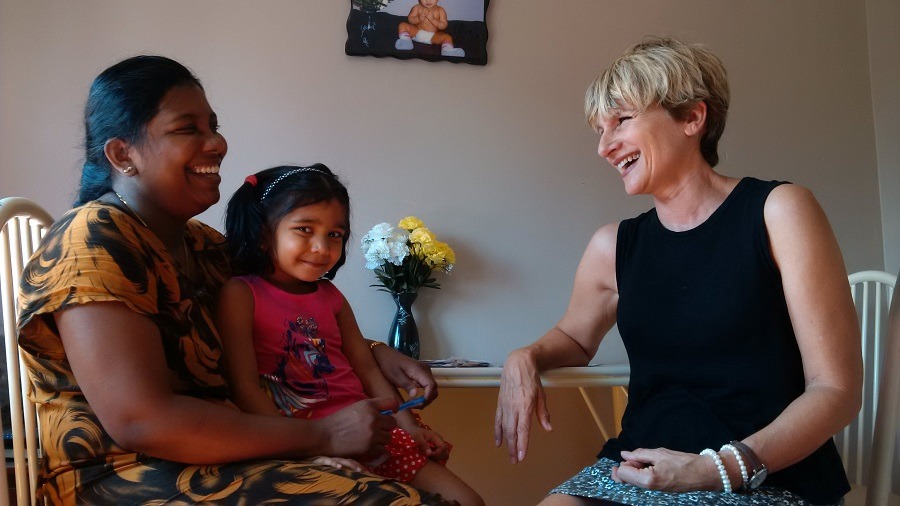Teacher in the House: Unique ESL Program Helps Newcomers Learn English at Home

As any parent will tell you, bringing a new baby into the world can be an overwhelming experience even when all the supports—relatives, neighbours and friends—are there to pitch in. But imagine if you were a newcomer with no family or friends nearby and limited language skills to communicate.
It’s a barrier that many new immigrants to Canada face and one that VHA Home HealthCare’s (VHA) In-Home English as a Second Language (ESL) Program is trying to help participants overcome. The project was developed through VHA’s Ideas to Action/Innovation Fund and began accepting clients in March.
Its aim is to help remove some of the roadblocks for new parents who also happen to be newcomers. While free community-based English lessons are available through the Language Instruction for Newcomers to Canada (LINC) program, most new moms are unable to attend because childcare is only available to kids 18 months old and up. The In-Home ESL Program brings the teacher right to clients’ homes once a week so they don’t have to worry about arranging childcare.
The initiative is, by all accounts, an overwhelming success. “It’s been really positive,” says Valerie Mason, VHA’s Co-ordinator for the In-Home ESL Program. “The volunteer teachers really enjoy the one-on-one with the clients who are finding their confidence is increasing—they’re feeling more comfortable.” She adds that while the In-Home ESL Program has been deemed a success on all sides, it will take a rest in mid-November for evaluation and, in so doing, hopes to secure long-term funding for 2018.
“It’s easy to take care of the kids and learn,” says ESL student and mother of two young children, Nishani Karnan. “It would be difficult to go somewhere else.”
Though Nishani took English lessons in 2012 when she arrived in Canada from her native Sri Lanka, language learning is a long road and new challenges have cropped up since her children were born, including a health challenge. Fortunately, her volunteer teacher Debbie Green was able to help by working with Nishani on language to explain symptoms in English to Nishani’s specialist.
For Debbie, a life-long volunteer, the work is fun and interesting. “I’m taking a language myself–I’m learning Spanish–and I understand how difficult it is to learn a language, so I have total empathy,” she says. “I find it really rewarding… You make a connection. It kind of gets you out of yourself and you’re helping someone,” Debbie notes thoughtfully.
“We try to customize each learner’s needs,” says Valerie, who also notes that the volunteer teachers receive ample training and other opportunities to improve their skills through regular lunch-and-learn sessions. Together teacher and student set three goals to work on throughout the duration of the course. Most are focused on improving communication for everyday tasks like talking on the telephone, chatting with neighbours and, most often, learning to more effectively communicate at the doctor’s office—especially handy since there are many appointments in a baby’s first 18 months of life.
For Nishani, the benefits extend beyond doctor’s visits and into her community. “I’m more comfortable talking to my neighbours,” she smiles shyly. The language lessons also help her build confidence in working towards her goal of higher education when her children eventually enter grade school. “I studied pharmacy in Sri Lanka so I want to go to college here,” she says. “I want to be a pharmacist’s assistant one day.”

